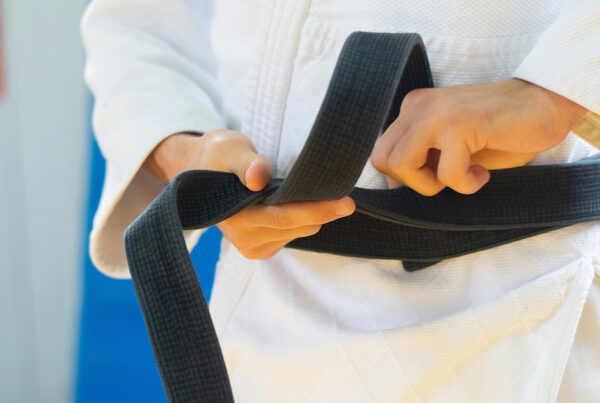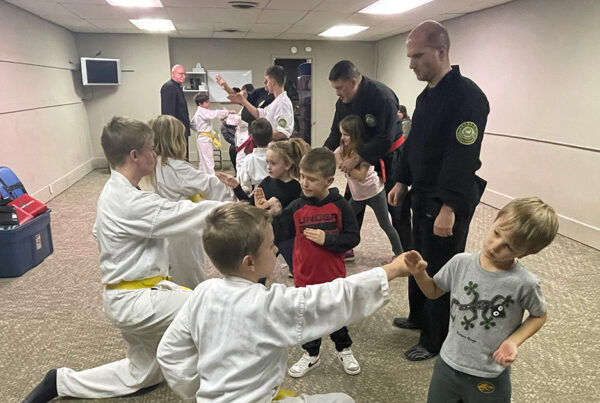It’s three minutes past the top of the hour.
You’ve just rushed to get your child to karate class, maybe even making a few “rolling stops” along the way.
Your heart sinks when you see the other students warming up because your child is late.
“Should we have come at all,” you ask yourself, embarrassed. “My child is the only one who didn’t make it on time.”
The black belt instructor glares from their position on the floor—you wonder what they’re going to say.
Your child is late to class.
What happens next?
Each martial arts instructor has a different philosophy when it comes to students being late to practice.
Some may assign students a physical punishment such as push-ups. I don’t like that because I want physical activity to be seen as positive and not associated with negative feelings.
Others may force the student to wait to enter the dojo floor for an excruciatingly long amount of time before acknowledging their existence. I once had an instructor do this, and it was humiliating to the student and uncomfortable to witness as a student already in class.
Instructors may also crack jokes at the student’s expense. I don’t understand this—why make fun of students who are probably paying you to be in class?
Devious instructors, in my opinion, may do any combination of these.
In this article, I look at the importance of being on time, why it matters, how you and your students can increase your likelihood of being on time, and what to do if you’re late to my class.
My Philosophy On Being Late
Students should do everything they can to arrive on time for class, and I provide steps you can take below to help with that.
But, I understand that life happens, so I’ll assume that if you’re late, there’s likely a positive reason.
Maybe your family had your first dinner together in a week because of your hectic schedules.
Maybe you were visiting a loved one in the hospital in between school and class.
Maybe you had to work late because it’s a busy season or you had to pick up someone else’s slack (you know who I’m talking about).
Maybe your student or one of your other children was at another practice before martial arts, and it ran late, so you had to quickly shuttle from one thing to the next.
Or, maybe you just lost track of time.
It doesn’t matter to me what your reason is.
Whatever it is, I don’t want to make students feel humiliated or unwelcome for being late to class.
Please—come to martial arts class, even if you’re late.
However, being on time is an important skill that children can learn from an early age.
Why Being On Time Matters
Students should strive to be on time for martial arts classes for several reasons.
First, punctuality shows that you’re organized and dependable.
It also shows that you are professional and pay attention to details.
Most of all, timeliness shows others that you respect their time.
All of these support the life skill of being on time that extends beyond martial arts classes—students who arrive to martial arts on time will likely also arrive on time for school, other sports activities, church, or other community events.
Students should assume responsibility for arriving to class on time, but parents have a role to play, too.
How To Be On Time For Martial Arts Class
First, know when class starts. You can work from that.
Next, parents should support their children in getting to class on time.
In other words, you can influence your child’s punctuality.
You can help with that by creating a pre-class routine to follow before class begins. This might be doing things like ensuring:
- Their phone or tablet (if they have one) is with them and they know what time it is.
- Their uniform is clean and ready for class.
- Their belt is paired with their uniform.
- They have something to drink, if you’d like.
- They have anything else they need to succeed during class time.
- Leaving your home (or school, or another practice) at a certain time to give your student plenty of time to arrive, visit with other students or the instructor, and get in the zone for class. You may need to give yourself a few extra minutes, depending on the weather.
I’ve found it’s best for younger students not to feel rushed or overwhelmed so they’re more likely to enjoy class.
This routine could be part of a consistent daily schedule on class days.
What To Do If You’re Late To Class
If you are late getting yourself or your student to martial arts class, the student will be expected to warm up prior to joining class using warm-up exercises we typically do at the start of class, like jumping jacks, arm circles, leg swings, and more.
Once the student is warmed up, he or she should raise his or her hand prior to entering the floor and ask:
“May I please join class?”
My answer will typically sound like:
“Yes, of course, come on in!”
If you’re late to class regularly, we’ll have a conversation outside of class time.
Final Thoughts
If you run into a situation where you’re wondering whether to stay home or get your child to class even if they’re late, please come to class.
I’d rather have students show up late than not come at all. They can still benefit if they apply themselves for the time they’re in class.
I don’t know what your day was like before you showed up, and (in the nicest way) I don’t care while I’m on the floor teaching everyone else.
I just want your child to be in class and enjoy learning martial arts.
Photo by Luke Chesser on Unsplash




